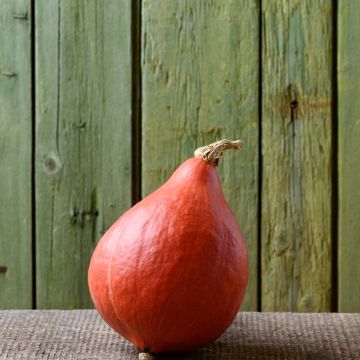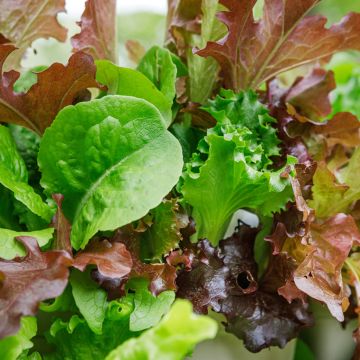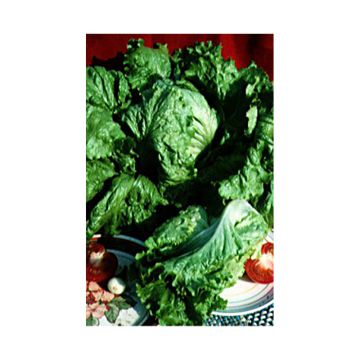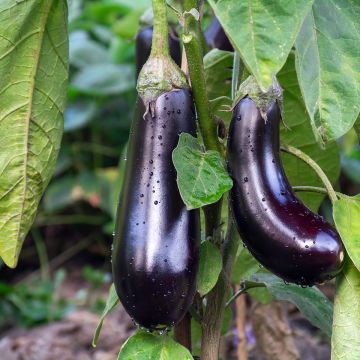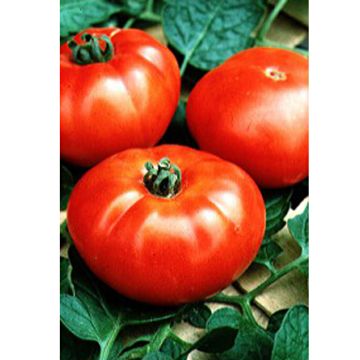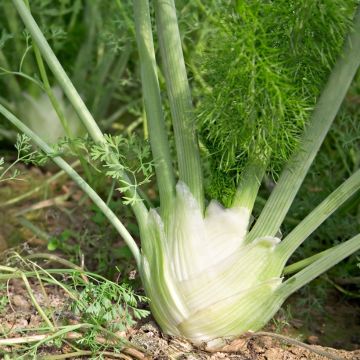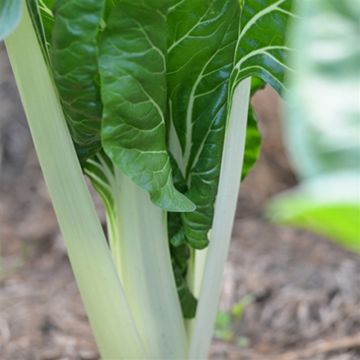

Tuscan Kale Nero di Toscana Organic - Lacinato kale


Tuscan Kale Nero di Toscana Organic - Lacinato kale


Tuscan Kale Nero di Toscana Organic - Lacinato kale


Tuscan Kale Nero di Toscana Organic - Lacinato kale
Tuscan Kale Nero di Toscana Organic - Lacinato kale
Brassica oleracea Noir de Toscane - Nero di Toscana
Dinosaur kale, Italian kale
Beautiful seed quality, excellent germination rate, and vigorous young plants!
Anthony, 17/04/2021
Special offer!
Receive a €20 voucher for any order over €90 (excluding delivery costs, credit notes, and plastic-free options)!
1- Add your favorite plants to your cart.
2- Once you have reached €90, confirm your order (you can even choose the delivery date!).
3- As soon as your order is shipped, you will receive an email containing your voucher code, valid for 3 months (90 days).
Your voucher is unique and can only be used once, for any order with a minimum value of €20, excluding delivery costs.
Can be combined with other current offers, non-divisible and non-refundable.
Home or relay delivery (depending on size and destination)
Schedule delivery date,
and select date in basket
This plant carries a 6 months recovery warranty
More information
We guarantee the quality of our plants for a full growing cycle, and will replace at our expense any plant that fails to recover under normal climatic and planting conditions.

Description
'Nero di Toscana' Tuscan or Dinosaur kale is a very hardy ornamental variety with large, dark green blistered leaves, which can be eaten as baby leaves or at full maturity. It forms large plants that can grow to 1.5 metres tall. Sow from March to August and harvest from September to February.
Kale (Brassica oleracea acephala) is a leaf vegetable belonging to the large Brassicaceae family (ex-Cole family). This biennial plant grown as an annual is a non-hearting form of green cabbage. It produces loose leaves that vary in texture and colour depending on the variety. Curly kale is the most commonly encountered variety with its attractive, very ruffled green, blue-green or even purple leaves. Cavalo Nero or Tuscan kale (sometimes sold as Dinosaur kale) is an Italian variety with long, slender dark green leaves. Russian kale is a smooth, oak-leaved variety with a slightly sweeter flavour. Kale was a popular vegetable during the Middle Ages before being grown mainly as a fodder crop. Recently rediscovered and hailed as a superfood, kale boasts a long list of nutritional values. It is low in calories, rich in minerals and loaded with antioxidants; it contains more vitamin C than an orange and more calcium than a glass of milk. To make the most of its “superpowers”, eat it raw in salads or blended into smoothies. Kale is also delicious lightly steamed or fried, added to quiches, gratins or mixed into a bowl of creamy mashed potatoes.
Kale is very easy to grow. It requires very little space and is exceptionally cold-hardy, withstanding temperatures as low as -10°C. It is also fairly resistant to pest attacks. Like almost all cabbages, it requires deep, rich soil and regular watering.
Harvesting: cut off the outer leaves with a knife. The plant will continue to grow and to produce new leaves. Kale leaves can be harvested from the tender leaf stage until full maturity.
Storage: Kale will keep for several days in the refrigerator. It is best eaten fresh to make the most of its vitamins. It also freezes very well after being blanched for 3 minutes in boiling salty water.
Good to know: Even if the vegetable garden is first and foremost a place for growing great quality veg, it’s always a good idea to leave a bit of room for flowers. Growing flowers alongside your vegetable plants will make your general gardening experience more enjoyable and is a great way to attract pollinators and repel garden pests! Flowers such as gaillardia, marigolds, zinnias, cosmos or nasturtiums can be sown in and around the rows of vegetables. Herbs such as dill can be very useful also. Bear in mind that some companion plants self-seed easily and can be a bit invasive (borage, chives, lemon balm etc.)
NB. Organic seeds (in French "AB" for "Agriculture Biologique") are produced from plants that aren't treated with phytosanitary products (insecticides, weed killers). The seeds do not undergo post-harvest treatment. They carry the AB label and are approved by Ecocert, an independent structure.
Report an error about the product description
Tuscan Kale Nero di Toscana Organic - Lacinato kale in pictures


Harvest
Plant habit
Foliage
Botanical data
Brassica
oleracea
Noir de Toscane - Nero di Toscana
Brassicaceae
Dinosaur kale, Italian kale
Cultivar or hybrid
Biennial
Planting and care
Sowing:
The germination temperature for Kale is between 7 and 29° and takes 4 to 7 days.
You can proceed with direct sowing or prepare seedlings that will later be planted in their final position in the garden.
Preparing seedlings: In a heated greenhouse, from late autumn to late winter, or in a cold greenhouse or nursery in the garden for the rest of the year, sow Kale seeds at a depth of 1 cm in good seed compost. Cover lightly with compost or vermiculite. Don't forget to keep the substrate moist but not waterlogged!
When the young plants appear strong enough to be handled, transplant them into pots if necessary and, for seeds sown in a heated greenhouse, gradually acclimatize them to cooler temperatures before transplanting them to the garden, when there is no longer any risk of frost.
Direct sowing: In properly amended and finely worked soil, create furrows about 1 cm deep, spaced 20/25 cm apart. Sow the seeds and cover them with a thin layer of fine soil. When the seedlings are well developed, thin them out, leaving one plant every 60 cm or so.
Cultivation:
Kale is grown in full sun or partial shade. It is a nutrient-hungry vegetable that requires well-rotted, nitrogen-rich, and potassium-rich soil. Ideally, in autumn, apply a generous amount of mature compost (about 3/4 kg per m2) by scratching it into the soil to a depth of 5 cm, after loosening the soil, as is necessary for all vegetable crops. It is not very tolerant of soil pH and should be maintained between 5.6 and 6.5. In acidic soil, gradually raise the pH by applying calcium in the form of Dolomite or Lime.
It is beneficial to associate Kale with many vegetables such as tomatoes, lettuce, etc. However, avoid planting it near other Brassicaceae plants, as well as zucchini, fennel, lamb's lettuce, leeks, and strawberries.
Seedlings
Care
Intended location
-
, onOrder confirmed
Reply from on Promesse de fleurs
Similar products
Haven't found what you were looking for?
Hardiness is the lowest winter temperature a plant can endure without suffering serious damage or even dying. However, hardiness is affected by location (a sheltered area, such as a patio), protection (winter cover) and soil type (hardiness is improved by well-drained soil).

Photo Sharing Terms & Conditions
In order to encourage gardeners to interact and share their experiences, Promesse de fleurs offers various media enabling content to be uploaded onto its Site - in particular via the ‘Photo sharing’ module.
The User agrees to refrain from:
- Posting any content that is illegal, prejudicial, insulting, racist, inciteful to hatred, revisionist, contrary to public decency, that infringes on privacy or on the privacy rights of third parties, in particular the publicity rights of persons and goods, intellectual property rights, or the right to privacy.
- Submitting content on behalf of a third party;
- Impersonate the identity of a third party and/or publish any personal information about a third party;
In general, the User undertakes to refrain from any unethical behaviour.
All Content (in particular text, comments, files, images, photos, videos, creative works, etc.), which may be subject to property or intellectual property rights, image or other private rights, shall remain the property of the User, subject to the limited rights granted by the terms of the licence granted by Promesse de fleurs as stated below. Users are at liberty to publish or not to publish such Content on the Site, notably via the ‘Photo Sharing’ facility, and accept that this Content shall be made public and freely accessible, notably on the Internet.
Users further acknowledge, undertake to have ,and guarantee that they hold all necessary rights and permissions to publish such material on the Site, in particular with regard to the legislation in force pertaining to any privacy, property, intellectual property, image, or contractual rights, or rights of any other nature. By publishing such Content on the Site, Users acknowledge accepting full liability as publishers of the Content within the meaning of the law, and grant Promesse de fleurs, free of charge, an inclusive, worldwide licence for the said Content for the entire duration of its publication, including all reproduction, representation, up/downloading, displaying, performing, transmission, and storage rights.
Users also grant permission for their name to be linked to the Content and accept that this link may not always be made available.
By engaging in posting material, Users consent to their Content becoming automatically accessible on the Internet, in particular on other sites and/or blogs and/or web pages of the Promesse de fleurs site, including in particular social pages and the Promesse de fleurs catalogue.
Users may secure the removal of entrusted content free of charge by issuing a simple request via our contact form.
The flowering period indicated on our website applies to countries and regions located in USDA zone 8 (France, the United Kingdom, Ireland, the Netherlands, etc.)
It will vary according to where you live:
- In zones 9 to 10 (Italy, Spain, Greece, etc.), flowering will occur about 2 to 4 weeks earlier.
- In zones 6 to 7 (Germany, Poland, Slovenia, and lower mountainous regions), flowering will be delayed by 2 to 3 weeks.
- In zone 5 (Central Europe, Scandinavia), blooming will be delayed by 3 to 5 weeks.
In temperate climates, pruning of spring-flowering shrubs (forsythia, spireas, etc.) should be done just after flowering.
Pruning of summer-flowering shrubs (Indian Lilac, Perovskia, etc.) can be done in winter or spring.
In cold regions as well as with frost-sensitive plants, avoid pruning too early when severe frosts may still occur.
The planting period indicated on our website applies to countries and regions located in USDA zone 8 (France, United Kingdom, Ireland, Netherlands).
It will vary according to where you live:
- In Mediterranean zones (Marseille, Madrid, Milan, etc.), autumn and winter are the best planting periods.
- In continental zones (Strasbourg, Munich, Vienna, etc.), delay planting by 2 to 3 weeks in spring and bring it forward by 2 to 4 weeks in autumn.
- In mountainous regions (the Alps, Pyrenees, Carpathians, etc.), it is best to plant in late spring (May-June) or late summer (August-September).
The harvesting period indicated on our website applies to countries and regions in USDA zone 8 (France, England, Ireland, the Netherlands).
In colder areas (Scandinavia, Poland, Austria...) fruit and vegetable harvests are likely to be delayed by 3-4 weeks.
In warmer areas (Italy, Spain, Greece, etc.), harvesting will probably take place earlier, depending on weather conditions.
The sowing periods indicated on our website apply to countries and regions within USDA Zone 8 (France, UK, Ireland, Netherlands).
In colder areas (Scandinavia, Poland, Austria...), delay any outdoor sowing by 3-4 weeks, or sow under glass.
In warmer climes (Italy, Spain, Greece, etc.), bring outdoor sowing forward by a few weeks.
































